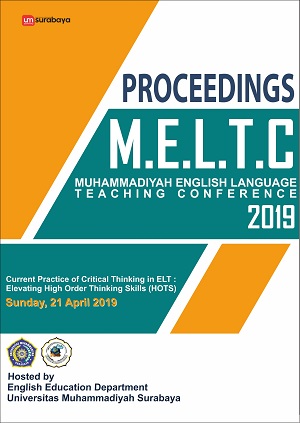Seeing The Preference Of The Genres Of Literature And The Four Primary Temperament Types As An Indicator Of Efl Reading Achievement
Abstrak
This paper described the study which tried to explore the impact of the four primary temperament types (Sanguine, Choleric, Phlegmatic, and Melancholic) and the preference of the genres of literature toward the achievement of reading like a foreign language. Hence, the objectives of the study were (1) to find out the impact of the four primary temperament types and the preference of the genres of literature toward EFL reading achievement, (2) to seek which more influential variable among the four primary temperament types and the preference of the genres of literature on EFL reading achievement. The population (N=43) of the study was the eleventh-grade students of SMA Muhammadiyah 2 Surabaya in the academic year of 2017/2018. The quantitative method was utilized in this study with the Multiple Linear Regression as a research design. In collecting the data, the researcher administered the reading preference questionnaire which consisted of 20 items and ready-made of the temperament type questionnaire consisted of 48 items. After administering the two questionnaires to the sample of the study, then the researcher conducted the IELTS-like test to obtain the score of reading achievement. In analysing the data, Multiple Linear Regression in SPSS 23.0 was utilized. The findings of the study revealed that there were simultaneous impacts of the variables of the Preference for Fiction (X1), Preference for Non-fiction (X2), and Temperament types (X3) toward Reading Achievement variable (Y). Moreover, only one independent variable which was the preference for fiction (X1) that had more influence toward the dependent variable. Therefore, it could be implied that the variable of preference for fiction (X1) had a significant impact on reading achievement (Y)
Keywords: Temperaments Type; Preference of the Genres of Literature; Reading Achievement.
Referensi
Andres, V. (2002). The influence of affective variables on ESL/EFL learning and teaching [Electronic version]. The Journal of the Imagination in Language Learning and Teaching, 17, 1-5.
Boeree, C. G. (1997). Personality theories. Utah: Utah Valley University.
Bouchama, Y., Poulin, V., Basque, M. (2013). The Impact of Students’ Reading Preferences on Reading Achievement. Journal of Scientific Research, 4 (8), 484-491. Laval University, Quebec, Canada. http://dx.doi.org/10.4236/ce.2013.48070
Eyong,Ikpi, E., David, B. E., Umoh, A. J. (2014). The influence of personality trait on the academic performance of secondary school students.Journal of Humanities and Social Science (IOSR-JHSS), 19(3), 12-19.Cross River State, Nigeria.
Kasschau, R. A. (1985). Psychology: Exploring Behavior (2nd ed.). New York: Pearson Prentice Hall.
Kaur, J. (2014). Personality development with English language.Language in India: Strength for today and bright hope for tomorrow, 14(5), 115- 122.ISSN 1930-2940.
Lamb, M. (2002). Explaining successful language learning in difficult circumstances. Prospect, 17(2), 35-52. University of Leeds, UK.
Susanto, A. (2016). How English learner succeeded in difficult circumtances. Jurnal Pendidikan Unsika, 4(2), 135-148. Universitas Putra Batam, Kepulauan Riau.






